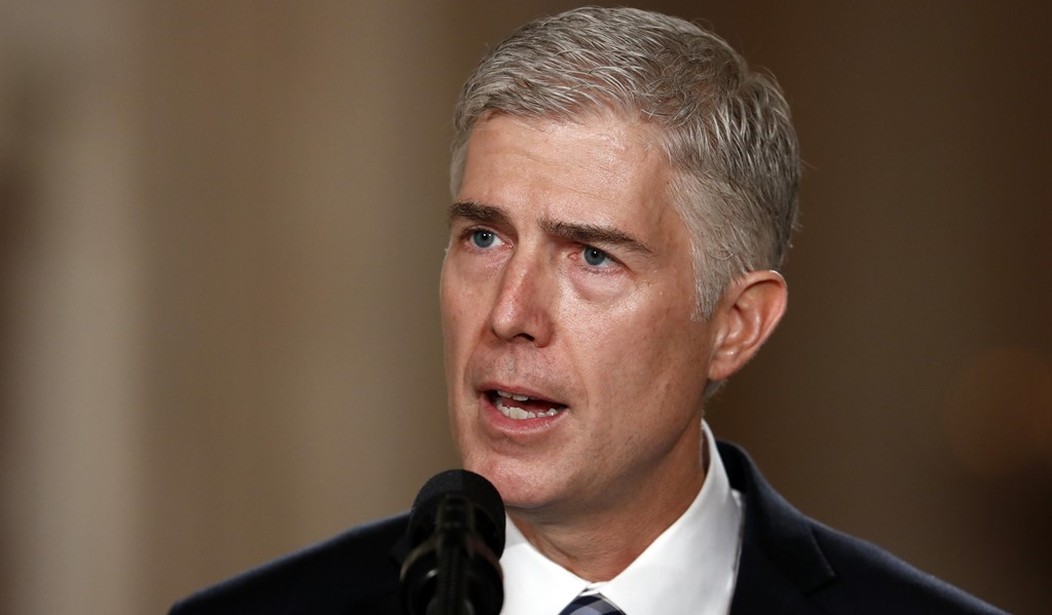The structure of American government has not received such a visible going-over since, oh, perhaps 1787.
I say for sure only that it is hard to remember a time that politicos and propagandists have wallowed with such abandon in discussions -- yelling matches, really -- about the relationships among the branches of governments, the power of states, the power of the bureaucracy, citizenship, voting rights, on and on. The whole of it occasioned by Donald Trump's inauguration.
Actually, no -- not unless we take the Trump presidency as something out of the blue instead of the logical outcome of debates carried on for many a decade in slightly less excitable tones, debates centered on the question of what kind of nation we seek to be.
The Constitution may be our great national charter, but any charter -- any legal fundament -- is subject to interpretation as to its exact meanings and applications.
That brings us to Judge Neil Gorsuch, nominated by President Trump to the Supreme Court seat left vacant by the death of Justice Antonin Scalia. The nomination is a wonderful stroke; it may come to be seen as justifying the tumult and shouting of the post-Inauguration Day period.
The liability that Judge Gorsuch bears, going into the confirmation process, is the hand that an inflammatory president has laid on his shoulder: "How good could he be if Trump likes him?" That sort of thing.
Democrats are sure to give him a good working-over on just such grounds. Pow! Wham! Take that! They did it to Robert Bork 30 years ago chiefly to show his presidential sponsor, Ronald Reagan, he wasn't the hot stuff voters seemed to think he was.
The stakes in the coming Gorsuch battle are at least as high as they were 30 years ago, in that the court is, more or less, evenly split between justices who see the court as a policymaking body and those -- like Gorsuch -- who see it as restrained by a sense of duty to our constitutional arrangements. In other words: Executives execute; lawmakers make law; and judges judge.
Recommended
Judge how? On the basis of some inner vision or grasp of transcendent qualities? Maybe, but that's what the lawmakers are supposed to do -- project an inner vision and make the force of that vision applicable across the board. Jurists, by contrast, are supposed to measure a policy or initiative by non-personal standards. What does that mean? It means that a judge may sift legislative intent, history or judicial precedents. Or -- we are led to believe this is the Gorsuch method -- the judge may look at the original meaning of the measure under review and appraise the fit.
The inherent modesty of the Gorsuch method (it was Scalia's as well) should commend itself to the constituents of a democracy balanced in its operations: no branch big enough or mean enough to ride down the will of the others. The difference between a law passed by Congress (the Affordable Care Act in 2010) and one "passed" by the Supreme Court (U.S. territories opened to slavery by Dred Scott v. Sandford in 1857) is that the former kind of law may be repealed at the people's direction, whereas only a constitutional amendment -- or a war, as in the case of Dred Scott -- can override the high court's determinations.
The motive power of the Trump movement is hard to judge. We are too close to it. We may speculate all the same that beneath the anger that voters of all races and classes have poured out lies a vast pool of frustration, its waters fed by the unwillingness of the politically powerful to consider whether they possess the actual power to decide what's good for everybody else.
Around and around in this pool of frustration Donald Trump swam, to notable effect. Shall we, in consequence, consider him the reincarnation of the Founding Fathers, working to put things right after more than a century of political deviance and error? I think, with an eye on the rage room the good old U.S.A. has turned into, I'll respond, politely: Umm ... no. But his ascent to office is a symptom of our afflictions, including the affliction of power wrongly distributed and wrongly employed -- and of the desire to at last do something about it.

























Join the conversation as a VIP Member